Max Renko speaks his mind
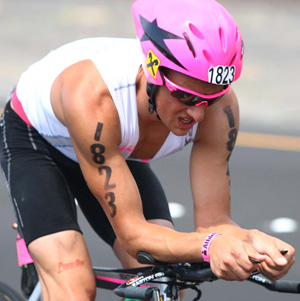
At the 2009 Ford Ironman World Championships, Max "Rocco" Renko won the 18-24 age group and posted the 3rd fastest age group time overall. This young Austrian athlete is not only very fast, he also has quite a few things to say.
Slowtwitch: Can we call you Max here or do you prefer Rocco?
Max: Either name is fine with me. "Rocco" is just a nickname that I got from friends a couple of years ago.
ST: After your age group win in Kona and the third fastest amateur time, are you still on cloud 9?
Max: Well I probably never really got up there since I always fall into some sort of post-race depression. You wake up totally FUBAR, that goal towards you were working for months is suddenly gone and you don’t know what’s to come next. Of course, the awards ceremony was great. Being up there with so many great athletes and getting the props put a huge smile on my face and made me realized what I had achieved. But it wasn’t like winning in the lottery, like "hey, whoops, I won! How did that happen?" I had worked very hard for that day.
ST: What expectations did you have going into Kona prior to the race?
Max: I was expecting to do well, knowing I had done all the important trainings and performed well in smaller races. That’s also what I told others when asked, making me feel very self-confident. I knew I’d be racing for the AG-victory and wanted to do well in the overall classification, but finishing as 3rd amateur and 35th overall surely surpassed my expectations.
ST: Talk about your race day.
Max: It was pretty unspectacular. The first half of the swim was a pretty bad mass fight, but that’s what happens when you’re in the big 60 min swim pack. As always my race started as soon as I got on my bike, making my way forward while trying to fuel properly, cool myself down and not to over pace. On the way back from Hawi I started overtaking some Pros, so I figured I wouldn’t do so badly, although I was surprised to find myself leading the M18 race as I left T2. On the run I went out hard, knowing that at some point Creeping Death would catch me anyway and I – simply put – wanted to have as few miles back home as possible. This is my first year I have been able to actually train running, after two years messing around with shin splints and stress fractures, so I knew I didn’t have enough miles in me to maintain the pace until the finish line.
ST: You won your age group in Lanzarote on a very tough course. Is that where you qualified?
Max: Yes. I’d say Ironman Lanzarote is even harder than Hawaii. Not as hot, but more wind and two serious climbs – good for an ex-cyclist like me. Also the race is a couple of weeks earlier than Ironman Austria, so I’d have more time to prepare for Kona. The race itself surely wasn’t my best performance ever, but I won my AG and got the slot – mission accomplished.
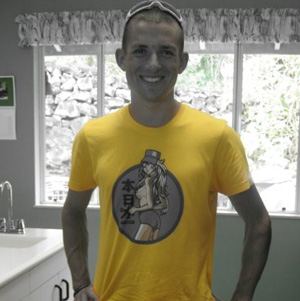
ST: In 2006 and 2007 you grabbed the age group title at home at IM Austria, and in 2007 you clocked an 8:54:53. But prior to 2006 you were mostly racing mountain bikes, is that correct?
Max: Yeah, I started MTB-racing in 2000 when I was 15. Later, I also did some cyclo-cross, road and track racing, but mainly for training. Having up to 30, 40 race days per year gave me a lot of racing routine and taught me how to really suffer when racing. I believe most IM triathletes don’t know what real suffering feels like. Back in my cross-country racing days, I’d go off with the gun and hammer until my vision blurred. I once raced with a HR monitor: Average heart rate over 60 min was 195 BPM, with a max of 202 BPM.
ST: It sounds like you no longer use a heart rate monitor, but how about a power meter on the bike?
Max: I train and race with a SRM powermeter. My trainer has a lot of knowledge and experience when it comes to training with power and my training has definitely improved a lot because of this. I only use a heart rate monitor when doing long easy rides – it gives you a hint how well you’re rested. There’s simply no point in going hard when your HR is 10 BPM higher than normally at the same wattage. Beside that we occasionally also do lactate tests during key work-outs, and last but not least I also listen to my body. So I’d say having a HR monitor is good, having a powermeter is better and being able to custom-tune your training using a mix of HR, power, feeling and lactate tests is the best way. In my run trainings I only use a Garmin GPS watch and only pace myself by speed – it’s pretty much like having a powermeter on the bike. Racing is a simple mathematical equation: Know your desired wattage and try to hold it as exactly as possible – in the flats, in the uphills and in the downhills. Ride 10 W higher and you’ll burn too many carbs, i.e. you’ll walk the run. Especially in self-paced racing events like tris and TTs having a powermeter is a big advantage.
ST: Which discipline would you now consider being your weakness, or should I say where you could still improve?
Max: The swim definitely is my weak point. I started learning how to swim three years ago, but swim training is the first to be cancelled when time is short. I just don’t like it and neither do I like starting the day in a cold pool swimming between two-legged whales and pubic hairs. But I have to improve. The winning days of the über-bikers seem to be over and with more short-course athletes doing IM you will need a decent swim in order to win. However, I’m sure my running will improve too as soon as I get the miles in.
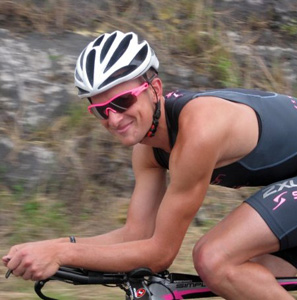
ST: Max, you did run a 3:08 marathon in Kona, how much faster do you think is possible, or should I say necessary?
Max: Well, my 3:08 might not seem that exciting on paper, as I’ve gone 3:09 twice before without any long jogs or serious run training. But this year Kona was really hard with the heat and the speed on the first 15 KM were pretty good. I just gotta do more run training in order to sustain the pace until the finish line and I’ll be fine. I know I have the engine to do 2:55, probably lower. Next year I might blow up after 25 KM, the following year after 30 and so on. I won’t start out slower. It doesn’t make a difference whether I run 4:15/KM or 4:30/KM – it’s all below the anaerobic threshold and the mechanical shocks will wear me out anyway after 7 hours into the race. So I try to go fast as long as the legs hold up.
ST: How much training were you putting in prior to Kona?
Max: Approximately 20-22 hrs during normal training weeks, half the time during rest weeks. Luckily I react very well to intensity. I’m not a big fan of super-long easy rides.
ST: Doping is a tough topic everywhere, but Austria seems to have been very much in the spotlight because of several big cases. Do you find that to be a problem for you in terms of respect or doubts?
Max: I can understand if people question athletic achievements. Doping scandals are all over the media here. Dopers lie all the time and thus undermine the credibility of us clean athletes. I wonder why I wasn’t tested after my race in Kona. I mean the entry fee isn’t really cheap and with 1,800 competitors there should be enough money to afford additional tests. But then again there’s the problem that you will only catch some small fish, while the top guys with big cash who can afford undetectable substances or bribe testing labs remain safe. So negative test results imply either that the athlete is indeed clean – or that he simply managed to manipulate the test. So even having negative test results might not prove anything to the critics. But if someone doesn’t believe me that I race fair and honestly, they can have a look at my constantly empty bank account any time.
ST: As we are talking about empty bank accounts, how are things going for you in terms of sponsorship?
Max: As an Age-Grouper I cannot complain. Of course I don’t earn any money but I’m lucky enough to have some faithful equipment sponsors. However, as a pro I gotta try to find some cash sponsors as well – I just don’t want to be a bum riding his bike.
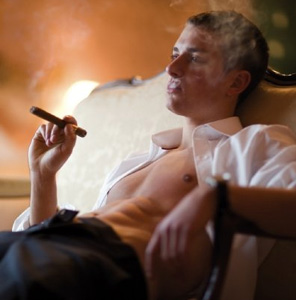
ST: How come no XTERRA Maui?
Max: No, not this year. My girlfriend and I did go to Maui after the Ironman, but only for vacation. Especially after the final weeks leading up to Kona she really deserved some one-on-one time. There is more to life than just swim/bike/run/eat/sleep.
ST: What will you be doing this winter?
Max: I don’t know what I’ll be racing next year, so I don’t have any plans yet. If I can afford it I might spend some weeks on Mallorca again. I just love the Balearic Islands.
ST: Do you follow any other sports?
Max: Synchronized swimming, curling, snooker and poker … nah, just kidding! Of course I watch cycling; beside that I like watching biathlon and cross-country skiing, especially when doing my winter training sessions on the trainer. But I don’t watch that much TV.
ST: Can you share with us some of your food likes and dislikes?
Max: I love Asian cuisine and healthy stuff – whole grain bread, muesli, low fat food and so on. But the more I train, the worse my eating habits become. In my peak weeks I was eating more than 1 kg of Nutella per week. I used to do the Peter Reid thing, a light anorexia athletica: weighing food, counting calories and starving in order to get my weight as low as possible, but then I had days when I would bonk in a 60 min recovery ride. I was actually increasing recovery time and destroying my training stimulus. This year I stopped counting calories, regained my sense for hunger and saturation and cannot remember bonking even once during training.
ST: What music do you like?
Max: My current playlist probably looks like this: Metallica, Rammstein, James Brown, Nirvana, Blondie, Ministry, The Prodigy, Tori Amos, Public Enemy, Blink182, Motörhead, Muse, Rage Against The Machine, Beastie Boys, Pulp, Ice-T, Sepultura/Soulfly, The Dust Brothers.
ST: What was the last book you read?
Max: “Die Physik der Superhelden” (English title: „The Physics of Superheroes“). It’s an incredibly funny and interesting read!
ST: Where do you see yourself in 5 years?
Max: I’m trying to turn pro for 2010 and working to finish within the top-10 in Kona sounds like a good goal. Beside that I hope I’ll have my university degree and will still be healthy, happy, in a relationship and enjoying what I do.
ST: What exactly are you studying, and at which university?
Max: I’m a student of international economics at the Vienna University of Economics and Business.
ST: Is there anything else we should know about you?
Max: I try to promote a more laid-back,self-ironic approach towards triathlon. At least over here it seems as if having fun in triathlon is a big no-go, especially among some age groupers. One of the best moments in Kona probably was when Marino Vanhoenacker came up to me after the awards and congratulated me (!) for my race. Some 11-12 h amateurs can’t even say hello… I say if you’re not doing it for the money, try to return from your rides with a smile and take it for what it is: a hobby.


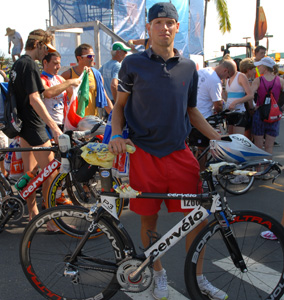
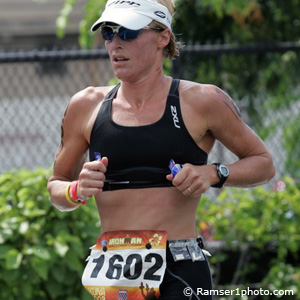
Start the discussion at slowtwitch.northend.network